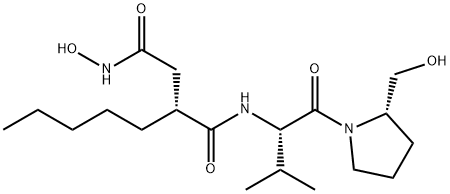13434-13-4
 13434-13-4 結(jié)構(gòu)式
13434-13-4 結(jié)構(gòu)式
基本信息
(-)-ACTINONIN
(R)-N4- 羥基-N1-((S)-1-((S)-2-(羥甲基)吡咯烷-1-基)-3-甲基-1-氧代丁-2-基)-2-戊基琥珀酰胺
物理化學(xué)性質(zhì)
安全數(shù)據(jù)
| 報(bào)價(jià)日期 | 產(chǎn)品編號(hào) | 產(chǎn)品名稱 | CAS號(hào) | 包裝 | 價(jià)格 |
| 2025/02/08 | HY-113952 | 放線酰胺素 Actinonin | 13434-13-4 | 1 mg | 454元 |
| 2025/02/08 | HY-113952 | 放線酰胺素 Actinonin | 13434-13-4 | 5mg | 1000元 |
| 2025/02/08 | HY-113952 | 放線酰胺素 Actinonin | 13434-13-4 | 10mM * 1mLin DMSO | 1100元 |
常見問題列表
Ki: 0.28 nM (Peptide deformylase (PDF)), 300 nM (MMP-1), 1,700 nM (MMP-3), 190 nM (MMP-8), 330 nM (MMP-9), and 20 nM (hmeprin α)
Apoptosis
Aminopeptidase M, Aminopeptidase N and Leucine aminopeptidase
Actinonin inhibits cell growth in various human tumor cell lines. The IC
50
of 4, 6.9, 12.8, 16.6, 27.4, 15.7 and 49.3 μM for Raji cells, MDA-MB-468 cells,PC3 cells, SK-LC-19 cells, Hela cells, HT-1080 cells and AL67 cells, respectively.
HsPDF is a critical target of actinonin and that the inhibition of this protein in the mitochondria leads to cell death in tumor cells. Actinonin treatment of cells led to a tumor-specific mitochondrial membrane depolarization and ATP depletion in a time- and dose-dependent manner.
Actinonin is a potent inhibitor of all three forms (Zn-, Ni-, and Fe-) of peptide deformylases from both
S. aureus
and
E. coli
bacteria. Under the assay conditions, the IC
50
values for Actinonin are 90, 3, 0.8, and 11 nM for Zn-PDF (
E. coli
), Ni-PDF (
E. coli
), Fe-PDF (
E. coli
), and Ni-PDF (
S. aureus
), respectively.
Actinonin is active against Gram-positive bacteria, including
S. aureus
(MIC value of 8-16 μg/mL),
Streptococcus pyogenes
(MIC value of 8 μg/mL) and
Streptococcus epidermidis
(MIC value of 2-4 μg/mL). Actinonin is also active against fastidious Gramne-gative bacteria, such as
H. influenzae
(MIC value of 1-2 μg/mL),
Moraxella catarrhalis
(MIC value of 0.5 μg/mL), and
Neisseria gonorrheae
(MIC value of 1-4 μg/mL). Actinonin is very active against the
H. influenzae acr
(MIC value of 0.13 μg/mL) and
E. coli acr
(MIC value of 0.25 μg/mL) efflux pump mutants.
Actinonin has been safely administered to mice as an antibiotic at doses up to 400 mg/kg. Actinonin does not appear to have significant toxicity to normal tissues, despite its antitumor activity in vitro. Remarkably, Actinonin exhibits significant antitumor activity when given i.p. or orally in a CWR22 human prostate tumor xenograft model in nude mice. During treatment, the animals show no signs of toxicity.
